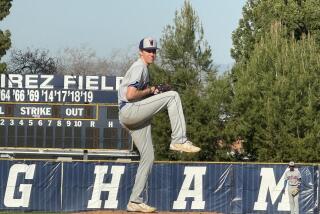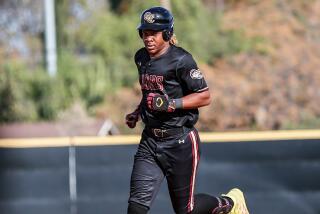Making a Minor Adjustment : Pro Baseball Players Fresh Out of College or High School Face the Same Challenges Regardless of How High They Were Drafted
- Share via
After the St. Louis Cardinals selected infielder Dmitri Young of Rio Mesa High with the fourth pick in the June amateur draft, they bestowed upon him three things:
1) $385,000.
2) An opportunity for an almost certain ascent to the major leagues.
3) A ticket to Johnson City, Tenn.
The Oakland Athletics selected pitcher Mike Rossiter of Burroughs with the 38th overall pick in the draft and gave him:
1) $125,000.
2) An opportunity for an almost certain ascent to the major leagues.
3) A ticket to Scottsdale, Ariz.
Draft position--and the money and the chances for advancement that come with it--separates Young and Rossiter from more than a dozen other Valley-area high school and college players who signed professional contracts this summer.
But every player concluding his first professional season--regardless of his organization or minor league team--has similar memories.
All of the Valley players who were drafted this year made the standard first-year salary of $850 a month. “When I got my first paycheck, I wanted to frame it,” Rossiter said. “But I had to cash it. I needed the money.”
For some, the biggest adjustment was being away from home for up to 2 1/2 months. Young, whose pro debut was delayed by contract negotiations, said he had never spent more than 2 1/2 weeks apart from his family.
For others, it was adapting to the competition, the wood bat and dealing with the mental and physical roller coaster every day.
“I thought that playing day in and day out would get monotonous and take the fun out of the game,” said Joel Wolfe, who played at Chatsworth High and was drafted out of UCLA in the third round by the Oakland Athletics. “But it really didn’t turn out that way. It made it more fun because you always know you’re going to be out there the next day.
“If things are going bad, there’s always tomorrow. If things are going good, you can’t wait to get back out on the field.”
Wolfe, who is batting .300 with one home run, 31 runs batted in and 18 stolen bases for Southern Oregon in the Class-A Northwest League, was one of several area players who posted outstanding statistics in their rookie years.
Jeff Cirillo, who played at Providence High and was drafted in the 11th round by the Milwaukee Brewers out of USC, is among the Pioneer Rookie League leaders with a .353 average, 10 home runs and 51 runs batted in in 51 games.
Craig Clayton, who was drafted by the Seattle Mariners in the sixth round out of Cal State Northridge, was promoted from Bellingham (Wash.) in the Class-A Northwest League to San Bernardino in the stronger Class-A California League three weeks ago. Clayton, a third baseman, batted .333 with three home runs and nine RBIs in 20 games for San Bernardino.
Former Northridge first baseman Scott Sharts, on the other hand, struggled at Watertown, N.Y., the Cleveland Indians’ affiliate in the Class-A New York-Penn League. Sharts, a 10th-round selection, set a Northridge career record with 51 home runs in two years and batted .290 last season.
However, through 55 games, Sharts was batting .162 with five home runs and 17 RBIs--and 63 strikeouts in 185 at-bats.
“For college players, this is an endurance test,” said San Bernardino Manager Tommy Jones, who has worked in the Kansas City, New York Yankee and Seattle organizations. “They’ve been playing baseball since last October in their school’s fall programs, then they play their regular 60-plus-game schedule, then they get drafted and go to a mini camp and then they start their pro careers.
“We want them to do well and have success, but what this first season is about is getting acclimated.”
For high school players, success is even more relative.
Consider, for example, a player such as Mitch Root, who signed with the Chicago Cubs out of Chatsworth High after being selected on the 16th round.
Root, a third baseman, batted .268 with one home run and 17 RBIs in 53 games for Huntington, W.Va., in the Appalachian Rookie League. Those are decent numbers on the surface. They are even better considering that Root’s average was third best on a team that batted .218.
“Mitch was one of the green leaves among a bunch of brown ones,” said Bud Bickel, Huntington’s general manager.
Young, who joined Johnson City of the Appalachian Rookie League in time to play 37 games, made the transition from shortstop to third base and batted .256 with two homers and 22 RBIs. That suited the Cardinals fine.
“Playing third is cake,” said Young, who made five errors. “It’s a lot easier than shortstop because all you have to do is react; you don’t have time to think.”
Other aspects of professional baseball have proven more challenging for Young.
“The hardest thing is getting used to the mental part of the game and figuring out your own mistakes,” he said. “You’re never really consistent because you have days when you hit the ball hard and go 0 for 4 and days when you barely make contact and go 3 for 4.”
Rossiter compiled a 3-4 record and 3.99 earned-run average with 35 strikeouts and 22 walks in 38 1/3 innings in the Arizona Rookie League. He has not pitched in two weeks because of tendinitis in his elbow, but the Athletics like what they have seen.
“With high school and college players, you’re talking about two different standards,” said Oakland scout Craig Wallenbrock. “With a guy like Rossiter, it’s ‘OK, we’re throwing you into a whole new environment from a competition standpoint plus all those other things in terms of adjustments.’
“We don’t really care how he does. We’re going to hold his hand for a couple of years.
“We expect college guys like Joel Wolfe to put up good numbers. When they do well, we’re pleased, but we’re not ecstatic because that’s what we expected.”
During the fall, Young, Rossiter, Wolfe and Clayton will take part in instructional leagues where prospects and players on rehabilitation assignments or involved in position switches work out daily and play games. And every player is readying himself for next spring, when he will be competing for jobs on their first full-season club.
Without exception, they hold one truth to be self-evident.
“There’s people that have to go out and work day in and day out the same place everyday,” Wolfe said. “I get to go to the yard and play this game. It’s like a dream come true.”
More to Read
Go beyond the scoreboard
Get the latest on L.A.'s teams in the daily Sports Report newsletter.
You may occasionally receive promotional content from the Los Angeles Times.











